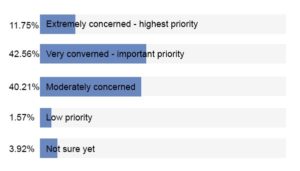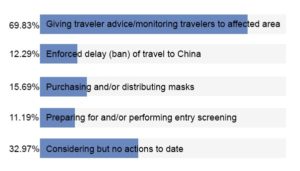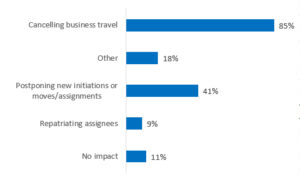Updated January 27, 2020
The coronavirus outbreak is evolving quickly. As of late Monday, January 27, the U.S. Centers for Disease Control and Prevention (CDC) issued guidance recommending that non-essential travel to China be avoided. Other countries, including Canada, have recommended avoiding all travel to the province of Hubei, the center of the outbreak, due to the extensive restrictions within the province.
Although the World Health Organization (WHO) has not yet designated the outbreak an “emergency”, new cases continue to be identified worldwide, creating heightened concern and anxiety.
Measures to contain the virus, which originated in Wuhan, China, have included health screenings at international airports and emergency evacuations of citizens by some governments.
As you might imagine, this situation raises concerns for international assignees and the people who manage them. As mobility professionals, there are several things you should keep in mind:
What should you do?
If your organization has a time-tested Emergency Preparedness plan, review your established protocols. If you don’t yet have a plan in place, we recommend that you consider the following:
- Collaborate with Corporate Health, Safety and Travel Security resources
- Assess or inventory your mobile population
- Contact all employees on assignment and ask your Emergency Assistance Provider to contact them, as well.
- Re-issue any emergency assistance provisions in your policy for international assignees.
- Provide emergency contact information.
According to partners at International SOS the response has been measured so far.
How concerned are you about the outbreak?

What has your organization done to date?

Our APAC leadership and Weichert Global Representatives in the area are monitoring the situation carefully. They advise that if government offices remain closed and travel restrictions stay in place, service delivery in the region could be adversely impacted. Chinese authorities have extended the national holidays by 2 days already, but there is the possibility that government bureaus and state-owned businesses will not reopen until February 10, 2020.
These extensions will affect all government bureaus, as well as state- and privately-owned businesses. It will also have an impact on visa offices, property management companies and other regional suppliers that provide services in and about assignees’ properties.
Typical emergency evacuation provisions include moving people to a “safe zone,” but in response to this situation that may not be advisable – make sure to confirm with your organization’s approved Health/Welfare resource before taking any action.
As you plan the support you can offer assignees in impacted regions, it’s important to know that most “emergency evacuation” policies cover the following benefits: evacuation and/or travel expenses; excess baggage; temporary living; school/tutoring; and possibly a miscellaneous allowance or cash advance to cover incidentals like medical supplies.
For more information on how to develop a broader Emergency Preparedness plan, check out our Duty of Care whitepaper. You can also stay updated on the situation through the following resources:
General Overview and Live Updates
South China Morning Post
CNN
WorldAware
World Health Organization
Travel Alerts & Precautions
Centers for Disease Control and Prevention
US Department of State
UK Government
Government of Canada
SHRM



